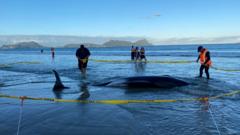A former Iranian minister of intelligence said that investigators have been unable to identify the perpetrators or methods behind the assassinations of several nuclear scientists, underscoring the country's intelligence gap with likely perpetrator Israel.
The remarks were among the most critical yet by a current or former top official on Iran's intelligence capabilities vis-a-vis a top national security dossier.
“In the assassinations of the four nuclear scientists ... we were unable to identify those who committed the crimes," Mahmoud Alavi was quoted as saying by Iranian media outlets. "Nor were we able to thoroughly study the methods of their assassinations."
He was referring to slain nuclear scientists Masoud Ali-Mohammadi, Majid Shahriari, Darioush Rezaeinejad and Mostafa Ahmadi Roshan.
"However, the case of (Mohsen) Fakhrizadeh was different. Everyone was identified. Nevertheless, we faced a vigilant enemy who, typically, would flee just half an hour before we could reach them,” added Alavi, a minister during Hassan Rouhani’s presidency.
Between 2010 and 2020, the five Iranian nuclear scientists were assassinated by various means but none of the killers have been apprehended.
Ali-Mohammadi was killed by a remote-control bomb attached to a motorcycle in Tehran on January 2010.
Shahriari and Ahmadi Roshan died when explosives attached to their vehicles detonated in attacks in 2010 and 2012. Rezaeinejad was shot and killed by motorcycle gunmen in Tehran in the summer of 2011.
Fakhrizadeh, an Islamic Revolutionary Guard Corps commander regarded as the chief of Iran's nuclear program, was shot dead by a remote-control machine gun in Damavand near Tehran in 2020.
 Iranian nuclear scientist and member of IRGC Mohsen Fakhrizadeh
Iranian nuclear scientist and member of IRGC Mohsen FakhrizadehHis comments cast doubt on the government’s earlier claims of cracking down on foreign espionage.
In 2012, the Islamic Republic executed Majid Jamali Fashi, accusing him of assassinating Alimohammadi. The conviction was based on video-taped confessions aired in a state-produced documentary called The Terror Club.
The program featured 13 individuals allegedly trained in Israel for espionage and sabotage, many of whom later recanted their confessions.
Maziar Ebrahimi, another person featured in film, described later how he was tortured into falsely confessing a leadership role in the team that killed Shahriari.
Released years later, Ebrahimi has since publicly denounced the confessions, accusing Iranian authorities of fabricating the charges. Now residing in Germany, he described systemic flaws in Iran’s judicial and intelligence processes during an interview with BBC Persian in 2019.
A spokesperson for Rouhani’s government Ali Rabiei distanced the administration from Ebrahimi’s case, saying it did not occur during their administration.
Rabiei conceded that some confessions were unreliable and improperly assessed, pointing to non-specialists’ involvement in critical counterintelligence investigations.
Unresolved case of Mohsen Fakhrizadeh
Fakhrizadeh, Iran’s leading nuclear scientist and a pivotal figure in its nuclear program, was assassinated on November 27, 2020, near Absard east of Tehran. Alavi said intelligence services identified the suspects’ movements but they repeatedly evaded capture.
“We tracked them to various cities—Arak, Hamedan, Sanandaj, and finally Saqqez—but ultimately lost them as they left the country,” he said.
International media reports described the assassination as an operation involving a remote-controlled weapon smuggled into Iran. The weapon was designed in Israel and assembled inside Iran and was part of an eight-month operation orchestrated by a 20-member team of Israeli and Iranian nationals, the Jewish Chronicle reported.
Espionage accusations
Iranian authorities have since announced arrests and indictments, but inconsistencies persist. Initial claims suggested five to six armed individuals were involved, while later reports cited indictments against 14 suspects.
Human rights organizations have identified several Kurdish detainees accused of assisting the operation and raised questions about the transparency and fairness of the investigations.
Despite sporadic arrests and indictments, Iran’s intelligence services have struggled to conclusively address these high-profile assassinations.
Judiciary spokesperson Asghar Jahangir recently announced the identification of eight individuals accused of spying for Israel, with three sentenced to death.
However, rights groups like Kurdistan Human Rights Network argue that these suspects were denied due process, including access to independent legal counsel during critical investigative stages.
The recurring failures to secure accountability may reflect broader systemic shortcomings in Iran’s security apparatus.
While officials have attributed the assassinations to Israeli operatives, some critics have pointed to internal weaknesses including flawed intelligence practices and politicized judicial procedures as contributing factors.

 2 hours ago
12
2 hours ago
12


